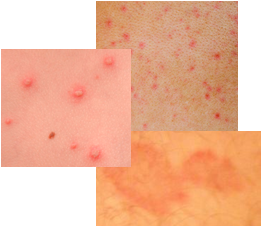Vitamin E Deficiency
Visit this
PICTURES OF RASHES PAGE
A vitamin e deficiency can affect proper health and proper skin care. Fortunately, for the most part, a deficiency of vitamin e is rare in humans. This is due to the fact that the body does not require large amounts of vitamin e to function properly and because vitamin e is available from many foods that are consumed by most people on a daily basis.
Causes of a Vitamin E Deficiency
Nevertheless, the lack of vitamin e in the body can occur it certain situations. For example, individuals with fat metabolism disorders resulting in the inability to absorb fat can lead to a deficiency in vitamin e. Some dietary fat is needed for vitamin e to be absorbed from the gastrointestinal tract and into the blood. Therefore, people on no fat or very low fat diets might be susceptible to a vitamin e deficiency. Individuals with Crohn’s Disease or Cystic Fibrosis, which affect the normal digestion process and the absorption of nutrients, can suffer from a deficiency in the e vitamins as well as other nutrients. A corresponding zinc deficiency can lead to low levels of vitamin e in the blood.
Other individuals at risk of developing a deficiency in vitamin e are: malnourished individuals, people older than 55 years of age, individuals under constant stress for a long period of time, people suffering from diseases such as pancreatic, liver, gallbladder, or Celiac disease, and drug and/or alcohol abusers.
Deficiency in Vitamin E Symptoms
A deficiency in vitamin e is characterized by the following symptoms: nerve degeneration in the hands and feet, poor transmission of nerve pulses leading to a number of neurological problems including shaky movements, retina degeneration possibly causing blindness, eye muscle paralysis, muscle weakness and poor muscle coordination, poor reflexes, and poor balance. In extreme cases, the lack of vitamin e in the body can lead to a person not being able to walk at all. Sometimes the appearance of age spots on the skin may signal a deficiency in this vitamin. However, confirmation of a deficiency in vitamin e can only be confirmed with the appropriate blood tests.
Curing a Deficiency in Vitamin E
A deficiency in vitamin e can be remedied easily in many cases by simply eating a well-balanced diet. In the cases where individuals have a health problem that prevents the absorption of vitamin e through a regular diet, then vitamin e injections or supplements might be required. This determination would be performed by a physician.
skin care | food for healthy skin | food for skin | vitamin d benefits | vitamin e | benefits of vitamin e | vitamin e deficiency | foods containing vitamin e | benefit of zinc | zinc deficiency | foods that cause acne
